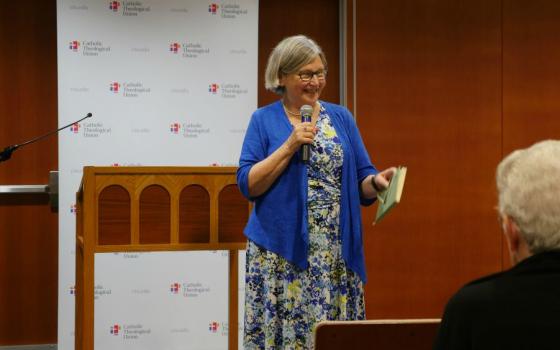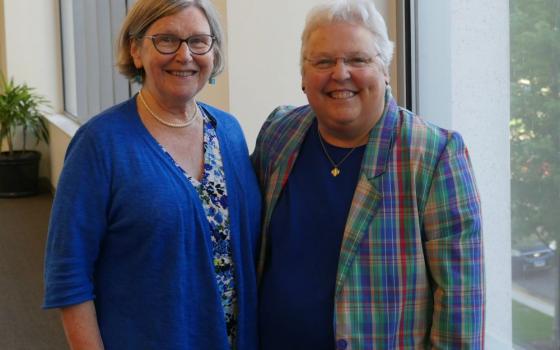'The Gospel is about fighting for a vision' — we can influence the political process, break through hateful times
In these "challenging times," it is not enough to fight against injustice, said Social Service Sr. Simone Campbell, executive director of Network, a Catholic social justice lobby, and organizer of the Nuns on the Bus campaign.
"If you push back against something, you reinforce the very thing you're pushing against," she said at a presentation June 13 at the Catholic Theological Union in Chicago. "You get stuck because you're both pushing."
Instead, Campbell said, "the Gospel is about fighting for a vision," the one Jesus articulated about the kingdom of heaven.
"That vision, I believe, our nation needs to know about and we need to fight for," she said.
Campbell told stories, described policy and legislation, and gave advice and encouragement to members of the crowd gathered at Catholic Theological Union, many of whom shared concerns about what she called "the rise of hate and a permission for racist tendencies to get expressed."
"We as a nation are better than this," she said after telling stories of people she has met who struggle to feed their families, are homeless, have no health care or are mired in student debt.
But to effectively influence the political process will require spiritual sustenance, said Campbell, who has 14 years of experience as a lobbyist in Washington, D.C.
"I believe our only way out of this mess is by rooting ourselves in a deeper faith ... into the depth of divine love that can help us break through in very hateful times," she said. "Absent a deep prayer practice, we're doomed."
The temptation is to become inured to the polarization, bullying and chaos in the political culture, Campbell said.
"But in tuning it out, we normalize the behavior," she said. "And when we normalize the behavior, then we expect it to continue."
Instead, Network has a proactive plan to "mend the gap," especially for those suffering because of economic and other injustices, Campbell said.
Network was founded in 1971, after the Second Vatican Council, by a group of sisters who wanted to engage in political activism for social justice at the federal level. It now includes thousands of men and women who support Network's lobbying efforts, which draw on Catholic social teaching.
Campbell explained Network's priorities, which include a fair tax policy, just wages and a family-friendly workplace. She decried policies and labor practices that leave workers unable to live on what they make, with no ability for recreation or saving for retirement, or with no paid sick time.
In addition to those three economic priorities, Campbell said Network advocates for four types of access:
- access to democracy, which includes voting rights;
- access to health care, which the church teaches is a basic human right;
- access to citizenship, which includes openness to immigration; and
- access to housing, which Campbell called a foundational, "lynchpin" issue because without it, people cannot find work, function as families and care for their communities.
"We don't need more high-end condos. We need housing for ordinary folks," she said. "And it's wrong in the richest nation in the world that we have people without health care."
Although the question-and-answer portion of the presentation showed audience members' discouragement with individual issues and the political process in general, Campbell seemed undaunted.
She said she recently sent House Speaker Paul Ryan, a Catholic Republican from Wisconsin, a personally annotated copy of Pope Francis' new exhortation, Gaudete et Exsultate ("Rejoice and Be Glad"), although she said he refuses to meet with her. Next week, she will give a workshop to House Democrats on how to talk about faith.
"I hope to get people talking about what really matters," she said.
Campbell said it is possible for Democrats to gain control of the House after this year's midterm elections but cautioned that politicians from both sides of the aisle need to be committed to governing, not just partisanship.
"We have to expect more ... It's up to us to say, 'We're better than this,' " she said. "When petty party politics undermines the common good, we have to stand up."
Quoting Pope Francis' encyclical "Laudato Si', On Care for Our Common Home," Campbell urged Catholics to "dare to turn what is happening to the world into our own personal suffering and thus to discover what each of us can do about it."
But it will require a willingness to take a risk and "let God take over our lives," which comes not just from academic assent to faith but the deep spirituality of contemplative practices "deeply rooted in a gospel of love that triumphs over all," she said.
"That's how I try to live my life: trusting," she said. "I don't see any other way out of this."
To save their sanity and to save democracy, activists cannot get distracted by the viciousness and hate, she said.
Grounded in the Gospel values, Catholics can lift up "who we really are" and even reach out in love to those with whom they disagree, she said.
"It's possible to solve problems together," she said. "We've got some work to do."
[Heidi Schlumpf is NCR national correspondent. Her email address is hschlumpf@ncronline.org. Follow her on Twitter: @HeidiSchlumpf.]


